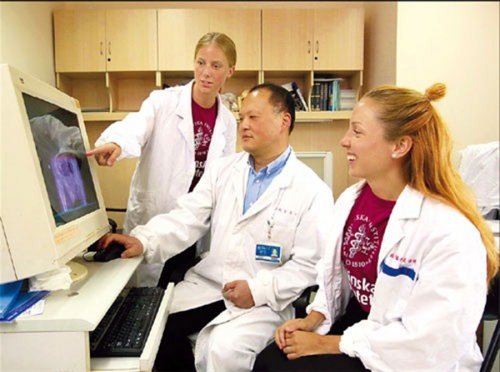
Hanna Lovbrand (right) and Diana Sylwander from Sweden work with
a Chinese doctor in Ruijin Hospital. The Swedes are in the city on
an medical exchange program. Shanghai health authorities are using
the exchanges to collect ideas on how to improve medical care. —
Wang Rongjiang
FOREIGN medical students on exchange programs in China are often
taken aback by practices here that contrast sharply with those back
home.
Like the absence of family doctors as gatekeepers to specialists.
Like clinic doors left open, allowing sundry people to wander in
and out while a doctor is seeing a patient.
When people need a doctor in China, they normally go to local
hospitals, which are usually crowded. Foreigners are amazed at the
workload Chinese doctors bear.
“Chinese doctors work so quickly,” said Hanna Lovbrand, a senior
medical student from Karolinska Institutet in Sweden. “They have to
make decisions within minutes because they treat so many patients a
day. In my country, by contrast, a doctor always talks with the
patient for about 20 minutes.”
She and fellow Swede Diana Sylwander are in Shanghai for a
10-week exchange program with Shanghai Jiao Tong University’s
School of Medicine. At Ruijin Hospital, one of the city’s leading
public health facilities, they have rotated through three
departments to view medical practices.
“We are interested in learning about the Chinese healthcare
system, Chinese medical practices and traditional Chinese
medicine,” Lovbrand said.
There are an increasing number of exchange programs being
initiated in Shanghai to foster sharing of information and
experiences between the city’s healthcare system and those of
foreign countries. The exchanges bring foreign medical students
here and send Chinese medical students abroad.
Lovbrand said she and Sylwander found that Ruijin Hospital’s
operating theaters, medical equipment and basic surgical procedures
are similar to those of Western countries. What is different is the
doctor-patient relationship, she said.
“What interests us is how Chinese patients know which specialists
to go to for their ailments,” Lovbrand said. “In Sweden, we must
first visit a family doctor, who then refers us to appropriate
specialists.”
Shanghai health authorities are using the exchanges to collect
ideas on how to improve medical care here.
“We are pushing cooperation with Western counterparts,” said Gao
Hong, an official of Jiao Tong’s School of Medicine who oversees
exchange programs. “It will help the young Chinese medical
professionals to learn from countries with more developed
healthcare systems. For example, our medical students can learn
about respect for patient privacy.”
It’s not only foreign students coming to China who benefit from
exchanges. Chinese medical students going abroad also come back
with experiences that shape their professional attitudes.
Dong Liang, a senior medical student at Jiao Tong, said he was
surprised by the practices he saw on a two-month exchange program
in Canada. While there, he was assigned to the internal medicine
department at Toronto General Hospital and also visited general
practice clinics in the city.
“In a Western hospital, a doctor is only part of the medical
team,” Dong said. “The team also includes nurses, social workers,
therapists and a patient’s family doctor. They receive daily
briefings on a patient’s condition and handle all related care,
such as rehabilitation and psychological support. Patients there
have a better recovery rate. We don’t have such a system in China.”
Chinese medical students are also surprised to see the respect to
patients and their privacy, he said. “It is prohibited there to
take photos or print out a patient’s record,” Dong said. “Doctors
can’t check the information on patients not under their care. All
these practices are unheard of in China.”
Dong said he would like to see China’s healthcare system develop
a frontline of primary care, which means general practitioners
seeing patients before specialists. That would ease the workload of
big hospitals and deliver better health care, he said. “Though
Shanghai has started to promote use of general physicians, the
training and promotion of family doctors lags behind the medical
systems of the West,” he said.
Jiao Tong’s School of Medicine is collaborating with the
University of Ottawa in Canada to establish a joint medical school
aimed at providing global physician education.
Jacques Bradwejn, dean of the University of Ottawa’s Faculty of
Medicine, said family medicine will be an important segment of the
joint program. “Family medicine is well developed in the United
States, Canada and many Western countries,” he said. “People get
primary care in their local communities, and the same family doctor
follows a person’s health track for a long time. We will train
Chinese medical students in family medicine, and we hope it will
provide a demonstration platform for Shanghai and China.”

